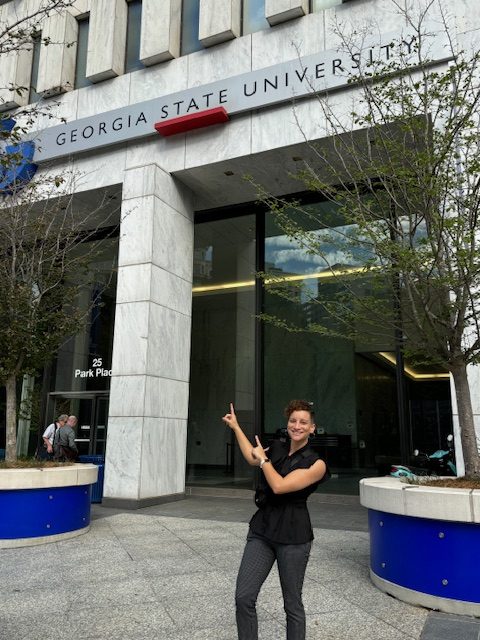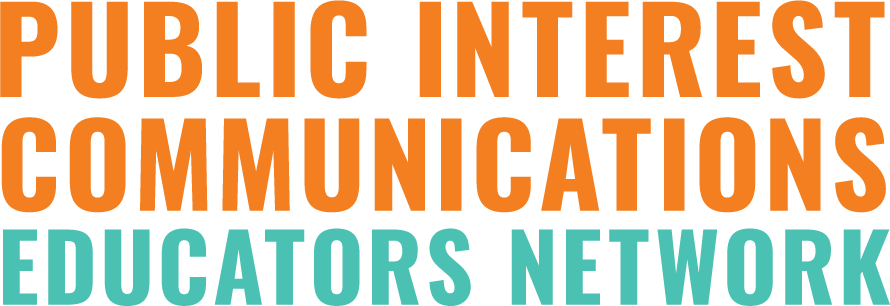The Public Interest Communications Educators Network, the University of Florida College of Journalism and Communications and Georgia State University Department of Communication are thrilled to bring you the 2025 Public Interest Communications Summer Institute, June 3-5, 2025!
Join university and college faculty, students, researchers, administrators and professionals who want to learn and share knowledge about the growing academic discipline of public interest communications. We’ll gather on the Georgia State University campus in downtown Atlanta for a day and a half of small-group sessions that will enable you to take a deep dive into issues and talk with our expert facilitators. We will hold a half-day syllabus workshop on Thursday afternoon after the formal program has ended.
Professors and administrators will learn how to introduce the field to their students. Students will learn more about public interest communications as well as career and research opportunities.
The institute offers valuable skills, networking opportunities and new friendships. Whether you are well-versed in strategic communications for social change or new to the field, this institute is for you!
Program
We are developing a robust program, with sessions on communicating about aging and public health, civil rights and democracy in Georgia and beyond, documentary filmmaking for social change and much more. Here’s what we have on tap so far. Please check back for updates.
Our Sessions
A Conversation With Abbigail Tumpey, Former CDC Communications Lead
Join us as we talk with Abbigail Tumpey, who oversaw the U.S. Centers for Disease Control and Prevention’s (CDC) communications efforts during the second year of the pandemic. Now vice president for Institute Communications at the Georgia Institute of Technology, Tumpey had a 25-year career at the CDC, with 21 years in communication leadership positions. She spearheaded numerous national and international public health campaigns, serving as one of the founders of the World Rabies Day initiative in 2007 and overseeing CDC’s antibiotic resistance communications efforts from 2009–2016. Abbigail served in a lead communication role during numerous outbreak responses, such as the 2012 multistate outbreak of fungal meningitis, the 2014-2015 Ebola outbreak, the COVID-19 pandemic, and the 2023 MPX pandemic.
Public Interest Communications: A Primer
Are you new to public interest communications or want to learn more about the basic concepts and frameworks? This session is for you! Expert public interest communicators will guide you as you explore what public interest communications is, key concepts and frameworks and how communicators make people care and get them engaged to address the world’s biggest problems.
Communicating in a Public Health Crisis: Lessons From the front
When a public health crisis emerges, communicators must race against time to gather information from scientists, confer with policymakers and craft effective communications to save lives. What does that entail? In this session, we’ll hear from Abbigail Tumpey, who spent 25 years at the U.S .Centers for Disease Control and Prevention (CDC), during which she served as head of communications during the second year of the pandemic, and Glen Nowak, who spent 14 years at the CDC, including six years as director of media relations and six years as communications director for CDC’s National Immunization Program. Tumpey is now vice president for Institute Communications at the Georgia Institute of Technology. Nowak is associate dean for research and graduate studies and co-director of Center for Health & Risk Communication at the University of Georgia. During this workshop, participants will practice risk communication strategies that can be applied to higher education and other fields.
Communicating Globally to Support Good Causes
With so many dire issues in the world to address – from hunger and disease to war and pollution – how do organizations motivate people to support their cause? In this workshop, we’ll hear from a researcher at the University of Newcastle in Australia about effective charitable framing, what research shows about communications around fundraising around illness and how charity law and regulations can shape engagement in charitable actions. We’ll also engage with a practitioner in the field, working to raise money for global initiatives.
Expanding Bandwidth: Digital Access for All
Strategic storytelling and smart communication drive tech equity from idea to impact. This hands-on workshop explores how to craft compelling narratives and campaigns that transform digital access into community power. Through real-world examples and interactive sessions, we’ll investigate how successful initiatives have used strategic communication to build support for tech equity, influence decision-makers, and create lasting change. Together, we’ll explore messaging frameworks that resonate, communication tactics that move people to action, and advocacy strategies that open digital doors. Whether you’re an advocate, communicator, or community leader, this workshop offers practical approaches to amplifying tech equity initiatives and building momentum for systemic change.
Reframing the Narrative Around Justice Impacted People
How we talk about poverty influences how we think about many systems, including the criminal legal system. What we see and read portrays poor people in an overwhelmingly negative light. How can we change that? Guided by the Southern Center for Human Rights, this session is designed to equip participants with strategic communication tools to challenge harmful narratives about the criminal legal system and those who are justice impacted. You will analyze dominant myths, explore ethical storytelling and learn how one organization develops values-based messaging to shift public perception.
Barriers to Entry: Black Feminine Leadership and Misogynoir in Political Discourse
This session unpacks how misogynoir creates barriers for Black women in leadership by examining Stacey Abrams’ historic campaigns in Georgia. Through an interactive exploration of tweets, quotes, and media commentary, participants will analyze how race, gender, and political discourse intersect to shape public perceptions of Black women in politics. Participants will leave with actionable strategies to dismantle these barriers and support Black feminine leadership.
Are You Old? Or Elderly? How Communications About Older Adults Affects Us All
Are you having “a senior moment”? Is someone in a long-term care facility a “patient” or a “resident”? In this session, we’ll explore how the words we use about aging and media portrayals of aging perpetuate harmful stereotypes and ultimately affect not only how we view and treat older adults, but our national policies around aging issues. Join Dr. Jaye Atkinson, chair of the Department of Communication at Georgia State University, as she shares her research examining portrayals of older athletes and older characters in blockbuster hit movies and Disney animated films.
Black Womanhood and Optimal Aging
Join Dr. Chris Omni, a Black women’s health researcher and optimal aging activist, as she shares her research, “Sitting with Trees: A Nature-inspired, Ethnographic Research Study about Optimal Aging and Black Womanhood.” In this interactive and intergenerational conversation, we’ll explore the Strong Black Woman Narrative and talk with Dr. Janet Haynes, 70, and Mrs. Gloria Ragsdale, 64, as they share lessons they learned while deconstructing the Strong Black Woman Narrative during their participation in the Sitting with Trees pilot study. You will learn about the Kujima Theory of Collective-Self Motivation and have the opportunity to write a love letter to yourself – an arts-based research method that supports the invitation to let BE-ing be enough.
Culturally Centered Pedagogy: Inspiring Students in the Classroom
How can we ensure that students from a variety of cultures and communities feel valued and heard in the classroom? How can communicate to set our students up to succeed? Join educators with decades of experience as they share their experiences and engage you in discussion and activities. This workshop will be led by Dr. Felicia Stewart, Professor and Chair of the Department of Communication Studies at Morehouse College. Dr. Stewart has years of experience educating and training students, faculty and executives in effective communication and is the author of books on African American rhetoric, organizational culture and political oratory.
Writing for Clarity in Public Health Communications
Public health is among the most challenging issues to communicate around because it requires crafting simple and clear messages from complex and nuanced scientific information. How do you boil down an academic research paper or a dense regulatory document? In this hands-on workshop, you’ll learn from experts who do this for a living and will put the tips into practice. Participants are encouraged to bring a two- to three-page excerpt of their own document to workshop. Whether you are a researcher, instructor, student or academic administrator, you’ll benefit from the valuable guidance offered by these experts.
Laughing Yoga
Laughing yoga with Celeste Greene! Join us as Celeste enhances our capacity to have fun and shows us how to experience joy and wellness.
Film Screening
Film screening and conversation with director Kristina Kendall: “Undivide US,” a film that explores political polarization in the U.S. and “challenges the idea that citizens who disagree are not capable of civil conversation.”
For Graduate Students
Grad students, road test your research! We will offer an opportunity for you to discuss your research with peers and faculty from around the country, as well as brainstorm research ideas. Plus, we’ll have a dedicated poster session where you can showcase your findings.
Check back soon for more details
For Undergraduate Students
We will offer a pitch competition and a chance to meet professionals in public interest communications who can talk to you about your interests and career opportunities.
Check back soon for more details
Schedule
We’ll start at 6 p.m. Tuesday, June 3, with our welcome reception. Our sessions will run 9 a.m.-5 p.m. Wednesday, June 4, and from 9 a.m. to 1 p.m. on Thursday, June 5. Our syllabus workshop will be from 2-5 p.m. Thursday for those who would like to stay. There is no extra charge for this, but we ask you to register for it in advance.
First time? Welcome! Learn more about the summer institute.
Please register early! The $80 rate will increase to $100 on Feb. 1, then to $120 on April 1. Students, we ask that you pay what you can, with a suggested registration fee of $50.
Hotel
We have booked room blocks at two hotels:
1) The Residence Inn Atlanta Downtown, 134 Peachtree Street NW, for $159 per night (not including taxes and fees). The last day to book to receive this group rate is Friday, May 2, 2025. Please book through this link.
2) Home 2 Suites by Hilton Atlanta Downtown, 87 Walton Street, for $159 per night. The last day to receive the group rate is April 4, 2025. Please book through this link.
Graduate Student Travel Support
We will offer travel assistance to a limited number of graduate students. We’ll consider applications on a first come, first serve basis. Apply here for travel funding.
Food
Tuesday: We’ll have plenty of great food at our Tuesday night reception. Have dinner with us while you mingle and make new friends!
Wednesday: Breakfast is included with your room. We’ll serve lunch on Wednesday and snacks throughout the day. Dinner will be on your own.
Thursday: Breakfast is included in your room. We’ll have snacks throughout the morning. The program will end at 1 p.m. Those who wish to stay for the syllabus workshop can grab lunch on their own.

Frequently Asked Questions
Please arrive on Tuesday, June 3, in time for our welcome reception, which will run from 6 to 8 p.m. We start our program first thing the next morning.
After our Wednesday opening session, we’ll go into smaller group sessions. You’ll have several to choose from. Grad students will have a research brainstorming and poster session. Thursday features a half day of workshops and a closing session followed by an optional half-day syllabus workshop.
Yes! We will provide a robust selection of food at our Tuesday night reception. We’ll serve lunch on Wednesday and snacks throughout the day on Wednesday and during our half day of programming on Thursday. Breakfast is included with your hotel room. Dinner Wednesday will be on your own.




